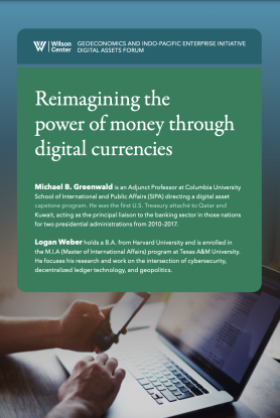Reimagining the power of money through digital currencies


The international economy is beginning to fracture around the emergence of new digital assets, increased interest in a financial system less dependent on the US dollar, and the human values that these changes represent. Currencies are at the heart of the global economy as they represent a shared medium of exchange that acts as an enabler or disabler of economic relationships. Ultimately, they have the power to shape the global economy and, in turn, geopolitics. With Russia’s invasion of Ukraine, unilateral US sanctions, and China’s ambitions to develop alternative frameworks for the global financial system, a post-SWIFT era is emerging. While the volume of international trade remains high despite recent disruptions, the rallying cry for a basket of currencies approach to dealing with debt instruments, trade, cross-border settlement, and the global economy is also increasing. Over the past century the dollar has been the center of the globalized economy, yet US allies and adversaries alike have been stepping up efforts to circumvent an American-centric system that is capable of putting holds on cross-border money transfers in times of crisis.
Authors:
Michael B. Greenwald is an Adjunct Professor at Columbia University School of International and Public Affairs (SIPA) directing a digital asset capstone program. He was the first US Treasury attaché to Qatar and Kuwait, acting as the principal liaison to the banking sector in those nations for two presidential administrations from 2010–2017.
Logan Weber holds a B.A. from Harvard University and is enrolled in the M.I.A (Master of International Affairs) program at Texas A&M University. He focuses his research and work on the intersection of cybersecurity, decentralized ledger technology, and geopolitics.

Indo-Pacific Program
The Indo-Pacific Program promotes policy debate and intellectual discussions on US interests in the Asia-Pacific as well as political, economic, security, and social issues relating to the world’s most populous and economically dynamic region. Read more

Explore More
Browse Insights & Analysis
360° View of How Southeast Asia Can Attract More FDI in Chips and AI




